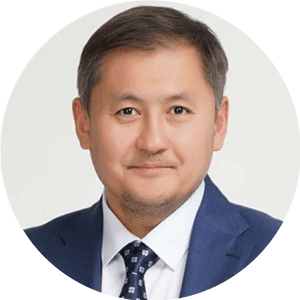Kazakhstan modernizes education and transforms economies with Coursera
- Industry:
Government
- Location:
Kazakhstan
- Size:
111,000 learners
- Topics:
AI, Learner Engagement, Career Credentials, Measurement & Outcomes
Overview

Kazakhstan’s Ministry of Science and Higher Education (MSHE) is modernizing the higher education system to align with the country’s shift from a raw-material export model to a diversified, tech-driven economy. Coursera aims to help improve the skills of graduates, who will contribute to the sustainable growth of the country.
In 2022, MSHE partnered with Coursera to equip students with in-demand, job-ready skills by integrating professionally relevant content into university curricula.
The project began with 25 universities and within a year expanded to 93 higher education institutions across Kazakhstan, providing access to world-class globally recognized courses and Professional Certificates to over 111,000 students to date. Universities across Kazakhstan now offer students a wider range of online, for-credit courses, marking a transformative shift from the in-class traditional education system.
The top skills being developed include computer science (Python), machine learning and AI, leadership, business, productivity, and time management, with recent additions of teacher training curriculum and generative AI.
Challenge
Modernizing Kazakhstan's Educational System
Kazakhstan's shift toward diverse, high-value industries posed several challenges for the government to align the education system with evolving national goals and ensure that graduates are equipped with job-ready skills.
Challenge 1: Aligning education with economic goals Kazakhstan began reducing its reliance on raw material exports in the early 2010s. In 2012, the government introduced the "Kazakhstan 2050 Strategy" to diversify the economy and decrease dependence on oil and gas. This strategy prioritizes developing key industries like manufacturing, agriculture, services, and technology. To support this shift, the government invested in infrastructure, attracted foreign investment, and focused on equipping people with relevant skills. Universities and colleges play an essential role in this vision by preparing a skilled workforce for these emerging sectors.
Minister of Science and Higher Education Sayasat Nurbek emphasizes the critical role of education in this transition, stating:
We are part of a global chain at its lowest level by producing raw materials. If you want to move up higher on the value-added chain, you need a workforce. You need trained people, professionals, and engineers, who do the processing and add value. To add value, it all comes down to your universities and colleges.
Challenge 2: Closing the skills gap As the economy transformed, higher education needed to keep pace. A significant step toward modernizing the education system was joining the European Higher Education Area, aligning Kazakhstan educational system with international standards. While universities provided a strong academic foundation, a more practical component was required to prepare graduates for the job market, which demands special technical and professional skills.
Challenge 3: Increasing global competitiveness Kazakhstan's higher education system needed to expand international reach, broadened students’ perspectives and make them more competitive in the global job market.
Challenge 4: Creating localized learning content
To reach students across the country and ensure equal opportunities, it was crucial to offer relevant content in their native languages, which required innovative, technology-driven solutions.

Sayasat Nurbek
Minister of Science and Higher Education
"In the context of globalization and digitalization, amid increasing competition in the global labor market, it is imperative to establish a flexible and open national education system that fosters continuous learning and enhances professional skills. This initiative holds paramount importance for our nation’s future, our language, and the overall enhancement of education quality and accessibility."
Solution
Localized Content Makes Digital Learning Accessible
After a meeting between President Tokayev and Coursera CEO Jeff Magioncalda in September 2022, the Ministry with the support of the Qazaqstan Halqyna Foundation launched a national initiative to provide Kazakh students with free access to Coursera.
Through this partnership, students can access a diverse range of disciplines including computer science, AI, STEM, biology and chemistry, professional skills in business, leadership, productivity, and business English. The curriculum includes selected pedagogy courses to support the development of the next generation of educators.
From the beginning of the partnership, the Ministry prioritized accessibility by ensuring content was available in Kazakh and Russian languages.
"In the context of globalization and digitalization, amid increasing competition in the global labor market, it is imperative to establish a flexible and open national education system that fosters continuous learning and enhances professional skills,” says Minister Sayasat Nurbek. “This initiative holds paramount importance for our nation’s future, our language, and the overall enhancement of education quality and accessibility."
In collaboration with Coursera, supported by local partner Bilim Media Group (BMG), over 100 university professionals, and the Qazaq Tili Society, 150+ courses were fully translated and dubbed. During the process of course localisation 8,750 professional concepts and scientific terms were translated into Kazakh further enriching the specialized vocabulary of Kazakh language.
Approach
Tailored Curricula with Local Partner Support
To align the program with national standards the Ministry formed a working group with the Republican Educational and Methodical Council of Higher and Post-University Education. This group collaborated with top educators to select courses for localization into Kazakh and developed a methodology for recognizing online courses in curricula that matched their bachelor’s and master’s programs.
Faculty engaged in thorough discussions about integrating digital learning, considering both potential benefits and challenges. Many faculty members were initially cautious about integrating online learning, hesitant to embrace such a significant change. Some universities were unsure how online learning would fit into their established curriculum, while others questioned whether digital content could meet their academic standards and teaching styles. To address these concerns, the Ministry and BMG offered targeted support, sharing success stories from international and Kazakh universities to demonstrate the positive impact and results of the online learning format.
Through these discussions, the Ministry and BMG helped universities recognize how integrating Coursera could support their academic goals and equip students with job-ready skills. This approach inspired a shift in mindset, with universities moving from initial skepticism to actively incorporating Coursera courses into their curricula.
The Ministry monitored progress closely and used a top-down approach to ensure effective use of Coursera licenses. University rectors approved the integration of Coursera courses into faculty curricula, allowing each faculty the flexibility to determine how best to incorporate the courses into their specific programs. Faculties followed guidance from the Ministry and BMG to recognize course credits. At least two project administrators, typically overseen by the vice-rector for academic affairs, were appointed to work with Coursera. These administrators connected students to the platform and facilitated the credit recognition process.
BMG provided comprehensive methodological support to assist faculty administrators with course integration and offered direct learner support for students:
An online calculator was developed to help faculty determine appropriate credit weighting for courses aligned with university disciplines.
Assistance was provided for students email validation and learner enablement on the platform
A Power BI tool was developed to streamline student progress tracking, monitor license usage, and securely share reports with the Ministry.
BMG created a website with detailed video and written instructions in the native languages, provided learner support through telephone, WhatsApp, and email, and organized Zoom sessions for students and faculty members—all available in both Kazakh and Russian.
The Ministry encouraged faculties to develop their own online courses using Course Builder, an AI-assisted authoring tool that helps professors create custom content. This initiative inspired faculties to integrate Coursera further into their teaching, fostering a culture of innovation and embracing further the concept of online learning and online teaching.
“Since the project's inception, there have been initiatives to develop author-led online courses by Kazakh professors,” says Bolat Zhamishev, chairman of the Qazaqstan Halqyna Public Fund. “The successful integration of digital technologies has made online learning a routine part of the educational experience for students and professors alike.”

Bolat Zhamishev
Chairman of the Qazaqstan Halqyna Public Fund
"Since the project's inception, there have been initiatives to develop author-led online courses by Kazakh professors. The successful integration of digital technologies has made online learning a routine part of the educational experience for students and professors alike."
Impact
Boosted Employability Through Innovation and Skill Development
The initiative has an impact on the changes in higher education in Kazakhstan, making Coursera courses a part of academic programs and marking a shift toward industry-aligned learning across faculties.
In the first year of the project all 25 participating universities had integrated Coursera courses into their curriculum, with nearly half of institutions fully adopting online programs to replace certain disciplines. In total, institutions replaced 116 disciplines with 853 standalone online courses and partially integrated 3,244 courses across 1,631 disciplines. The availability of courses in Kazakh, English, and Russian has been essential to student success, with annual course completions of 29,708 in Kazakh, 29,515 in English, and 13,604 in Russian.
Overall, in 2023 the widespread adoption of courses on Coursera reached over 46,000 learners, who collectively earned 73,000 certificates.
Kazakhstan’s higher education leaders incorporated Coursera into a three-year higher education plan and in 2024 the program had expanded to 93 universities reaching 67,000 students.
The partnership is having a serious potential for positively influencing student outcomes and career prospects in diverse and inspiring ways:
More women in technology: The high enrollment of women in software development and Python courses is a positive trend, with more women actively acquiring tech skills and pursuing careers in historically male-dominated fields.
Improved Efficiency: Rakhat and Abat, students from Zhubanov University, developed an electronic queue system to reduce lengthy applicant wait times, leveraging their new skills from Coursera despite facing integration and real-time update challenges.
Entrepreneurial success: Zhanbota, from Mahambet Utemisov, West Kazakhstan University launched her own bakery, applying the insights gained from the University of Virginia’s Business Strategy course on Coursera.
Innovation champions: At Atyrau University, thirteen learners who earned certificates on Coursera in innovation and entrepreneurship won local startup competitions, through practical application of their new skills.
Industry alignment: Eight business administration learners secured jobs at a local programming school after completing Python and other programming-related courses.
Enriching Kazakh language: As part of the localisation process over 8,750 new concepts and scientific terms were translated into Kazakh.
Flexible learning: Karaganda Industrial University modernized its curriculum with online courses in graphic design, big data, and cybersecurity. This allows students who were unable to attend classes due to illness to continue studying via Coursera and earn full credit.
AI technology integration: Kazakhstan’s universities used the Course Builder AI tool to create customized, locally relevant courses. Courses “The Basics of Business Planning”, “Journey into the Cell”, and “Logic: The Science of Correct Reasoning” were specifically developed through this initiative.
Impact Snapshot
93
universities transformed across the nation in just one year modernizing academic frameworks
1,631
disciplines have incorporated Coursera content aligning education with industry demands
208K
Professional Certificates earned, empowering learners with job-ready skills
8,750
new concepts and scientific terms translated to Kazakh through course localization efforts.
150
courses localized into Kazakh and Russian, enhancing accessibility for students across the country
Looking Ahead
Building a Globally Competitive Workforce
The MSHE’s partnership with Coursera has exceeded expectations, with high enrollment and nationwide curriculum integration across institutions. As a result, MSHE doubled the license allocation in 2024 to 40,000 and is localizing the next set of courses on Generative AI, marketing and machine learning. Another key focus is integrating Coursera into pedagogical curricula to enhance the skills of future teachers. To ensure academic integrity, the Ministry is piloting an auto-proctoring solution for large-scale remote exams.
This initiative highlights the power of collaboration between government, academia, and industry in improving educational outcomes and positioning Kazakhstan as a regional role model in building an engaged, digitally skilled workforce with strong employment prospects—ready to tackle future challenges and support the country’s shift to a value-added services economy.
